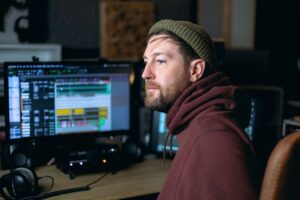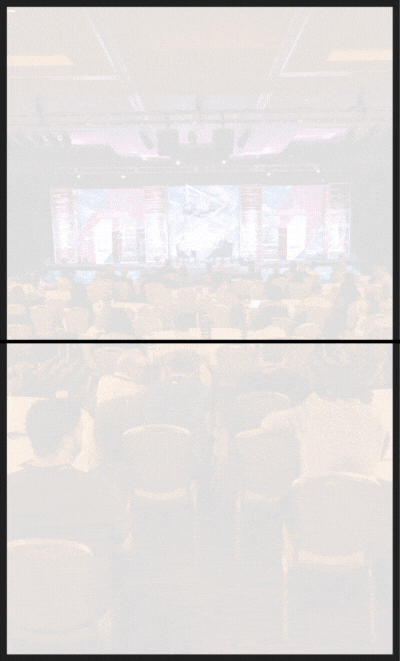
Presented by Spotify for Podcasters
Be true to yourself. Don’t tell jokes that don’t make you laugh. Don’t tell stories that don’t make you cry.
Dan Harmon
The 3 Stages of Writing a Podcast Script
The first stage is an act of determination. Here, grit powers you through the blank page. You gather resources to aid in your journey; research and interviews deepen the story, while language sketches and colors the narrative landscape. Things take shape. Your first draft is done. But don’t hold too tight because…
The second stage is an act of destruction. Self-editing and feedback bring to light the challenging truth that there’s still much work to do. It’s time to break it all down to build it stronger. Iterate, iterate, iterate until the vision comes into clear focus.
The third stage is an act of redemption. It’s here the pressures of global edits alleviate and give way to the not-so-distant finish line. Now it’s time to polish. To punch up jokes. To steepen cliffhangers. To sharpen arguments. To spitshine sentence structure and give bite to word choice. To recognize the script that seemed impossible now exists. Cherish this stage and use it as fuel to start the engine all over again. Because it’s here the hardship of writing becomes the reward of having written.
Signal Flow: Matt McGinley
Industry game changers and valiant minds from other creative professions share their wisdom, adversities, and paths to innovation.

As a contributing music producer for the nationally syndicated public radio show This American Life, Matt McGinley is a musician and composer also known for his work with the band Gym Class Heroes as the co-founder and drummer. He’s composed music for Serial, S-Town, Nice White Parents, The Trojan Horse Affair, We Were Three, and the forthcoming feature film, The Disruptors.
The first step is almost always the same, which is to instill confidence in the show's producers by convincing them I can do what they’re asking for. After which, I privately panic that I've taken on more than I'm capable of and will potentially just let everyone down. Once that's out of the way, I take a beat, make a cup of coffee, start to conceptualize the creative direction, and get down to business.
Before I begin making any actual music, I'm just taking a lot of notes and listening intently. And having a discussion with the producers about what their musical goals are. For example, should the music evoke a specific genre or mood? Or environment? Is there a playlist of existing pieces of music that reflect the episode or the show that they're making? At that point, I'm just wanting to understand the role the music will need to play to help progress the story. That's around the time I'm given tape or audio, or a script, all of which contribute to my creative decisions.
If I can hear a little bit of the host and how they narrate, that's super helpful to me. Hearing their pacing helps inform the tempo of a song; their tone can help inform what instruments might best support that person's unique tone. I'm always wanting to choose instruments that will do the job of creating music, but also stay out of the way of the narration, not muddy the story.
There was a creative satisfaction I wasn't getting from touring with bands and musicians. And so I knew I wanted to be composing music. And it just seemed like an impossible door to enter through.
I had gone through a Berkeley program for composing for film and TV. And of course, when you're working through that program, you're just assuming, I'm gonna finish this and then I'll be scoring the next Marvel movie in no time. And then you realize, oh man, I don't know if those goals are as easily obtainable as I once thought.
I never really thought of composing for podcasts. I was touring with Ryn Weaver and the guitar player got an email from a friend who said, “This American Life is looking for music for their library.” He passed the email on to me. It was like, of course, why didn't I think of that?
The early days of podcasting were this Wild West, anything goes place. Shows were putting The Beatles or Beyonce in an episode, way back in 2014 or so. Licensing regulations started to take place around podcasting, and suddenly you couldn't just use whatever music you wanted. It created quite the dilemma, which is why This American Life was looking for composers to build a library of music to replace the old songs and compose for episodes moving forward.
I don't really log off a project until it’s out in the world and it's too late to make changes. There have certainly been podcasts, like S Town for instance, where I was literally working on some of the music until the night before it went out.
I think of each song as being in two halves. The first half needs to be easy to talk over and should help move the listener through the story without pulling focus from the narration—introduce the idea in bits and pieces, and then build up from there. For me, emotional neutrality is the key.
The second half is where the song can loosen up a bit. With This American Life, for instance, oftentimes what happens is that the music enters underneath dialog, and then at some meaningful moment the music swells into the clear for a few seconds, as if to underline what's just been said. This is where the emotion or character of the music can be a bit more grand.
Occasionally, I'll try to deviate from that. And I'll go, oh, man, but it feels so nice if I just end on this weird moment of tension or suspense. And then I start to doubt myself and try to be more simple, straightforward, and neat. But I wonder…can I take the weird route? Just give it a shot and see how it plays out? And I'm like, yes, you can. You can do whatever you want.
Every year, Wrapped brings millions of eyes (and ears) to Spotify, prompting fans to share their favorite podcasts – including yours. Spotify for Podcasters has a checklist to help get your show looking its best for your next wave of listeners. Check out The 2023 Wrapped Checklist.
Further Exploration
The Transformative Power of Classical Music
Feast your mind on the infectious joy of Benjamin Zander. He’s zany. He’s heartwarming. And he’s one of my favorite people. When I’m feeling uninspired, this 15-year-old TED Talk never fails to remind me of the power of possibility. (I’ve been fortunate to interview Ben twice, and yes, he’s still as passionate today in his 80s.)
Want Free Feedback on Your Podcast Trailer?
I’ll select a trailer every month to provide free, in-depth feedback. Sound like something you’re interested in? Subscribe to the Noise Gate so you can reply to the next issue with a link to your trailer. I’ll let you know soon if you’ve been selected.
Enjoying The Noise Gate? Why not share it with a fellow podcaster?
Until next time, have a bold week.
– Doug
For advertising information, contact Kristy at kristy@podcastmovement.com





Join the Movement